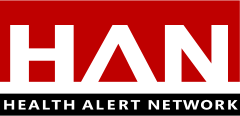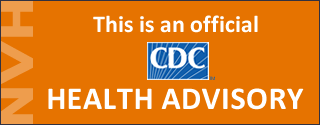Update: Multistate Outbreak of Fungal Meningitis and Joint Infections Associated with Contaminated Steroid Medications
Distributed via the CDC Health Alert Network
October 17, 2012, 13:15 (1:15 PM ET)
CDCHAN-00329-2012-10-17-UPD-N
Summary
The Centers for Disease Control and Prevention (CDC) and the Food and Drug Administration (FDA) continue to work closely with state public health departments on a multistate investigation of fungal meningitis and joint infections among patients who received a methylprednisolone acetate injection prepared by the New England Compounding Center (NECC) in Framingham, Mass. Some of these patients who received epidural injections also suffered strokes that may have resulted from their infection. This HAN notice provides updated information on the following:
- Status of the investigation.
- FDA issuance of a MedWatch Safety Alert on October 15 advising clinicians to follow-up with patients who received an injectable NECC product, including any ophthalmic drug that is injectable or used in conjunction with eye surgery, and a cardioplegic solution purchased from or produced by NECC after May 21, 2012.
- Recommendations for clinicians.
- Case definition.
Background
CDC, in collaboration with FDA, state public health departments, and state boards of pharmacy, has been investigating an ongoing outbreak of fungal infections associated with a contaminated steroid medication, preservative-free methylprednisolone acetate (80mg/ml) prepared by the New England Compounding Center, in Framingham, Mass. CDC and state public health departments are actively coordinating outreach to patients who have been exposed to this contaminated medication.
As of October 16, 2012, a total of 233 cases, which includes 2 peripheral joint infections and 15 deaths, have been reported in 15 states (see CDC’s website for up-to-date information about case count and distribution by state). The fungus Exserohilum rostratum has been reported in clinical specimens from multiple patients with fungal meningitis and with other spinal infections (e.g., epidural abscess). CDC and FDA continue to investigate the possibility of contamination with additional organisms. At this time, one clinical specimen has tested positive for the fungus Aspergillus fumigatus, and another has tested positive for the fungus Cladosporium. Fungal meningitis is not transmitted from person to person.
The clinical presentation of infected patients with fungal meningitis remains consistent with that described in previous reports: onset of symptoms is typically between 1 to 4 weeks following injection with a variety of symptoms, including fever, new or worsening headache, nausea, and new neurological deficit (consistent with deep brain stroke). However, fungal infections can be slow to develop, and there are reports of longer periods between injection and onset of symptoms; and, therefore, patients and their doctors need to watch closely for symptoms for at least several months following the injection. Some of these patients’ symptoms were very mild in nature. Cerebrospinal fluid (CSF) obtained from these patients has typically had an elevated white cell count (usually with a predominance of neutrophils), and in many cases low glucose and elevated protein. As of October 16, two peripheral joint infections have been reported. CDC expects that through ongoing patient notification efforts, additional patients with infections of the joints may come forward.
On September 26, 2012, NECC voluntarily recalled the following lots of methylprednisolone acetate (PF) 80mg/ml:
- Methylprednisolone Acetate (PF) 80 mg/ml Injection, Lot #05212012@68, BUD 11/17/2012
- Methylprednisolone Acetate (PF) 80 mg/ml Injection, Lot #06292012@26, BUD 12/26/2012
- Methylprednisolone Acetate (PF) 80 mg/ml Injection, Lot #08102012@51, BUD 2/6/2013
On October 6, NECC expanded its previous recalls to include all products currently in circulation that were compounded at and distributed from its facility in Framingham, Mass. More information about this recall is available at the FDA website.
All cases reported as of October 16 have occurred after injections with methylprednisolone acetate products from one of the three lots recalled on September 26.
FDA MedWatch: Additional NECC Products of Potential Concern
On October 15, FDA released a MedWatch Safety Alert announcing that, as a result of the ongoing investigation of NECC, a patient with possible fungal meningitis who had received an epidural injection of triamcinolone acetonide produced by NECC has been identified through active surveillance efforts by CDC and state health departments and reported to FDA. Triamcinolone acetate is a type of steroid injectable product made by NECC. As of October 17, there is no laboratory evidence of fungal infection in this patient. As noted above, all cases of fungal meningitis identified to date have been associated with methylprednisolone acetate, another similar steroid injectable product distributed by NECC.
In addition, FDA received a report of one cardiac transplant patient with Aspergillus fumigatus infection who was administered NECC cardioplegic solution, which is used to prevent injury to the heart during surgery. Investigation of this patient is ongoing; there may be other explanations for this patient’s Aspergillus infection.
This is preliminary information and CDC does not have firm evidence that infections have been caused by exposure to NECC products beyond the three previously listed lots of methylprednisolone acetate. Out of an abundance of caution, FDA has advised clinicians to follow up with patients to whom they have administered an injectable product, including an ophthalmic drug that is injectable or used in conjunction with eye surgery, and a cardioplegic solution purchased from or produced by NECC after May 21, 2012.
Clinicians should perform a thorough diagnostic evaluation to exclude infection in those patients who report signs and symptoms of infection following high-risk exposure to one of these NECC products (e.g., exposure of product to sterile body site). If the evaluation of these patients is suggestive of fungal infection, please consult existing CDC treatment guidance https://www.cdc.gov/hai/outbreaks/clinicians/index.html. Consultation with an infectious disease specialist is strongly encouraged to help make treatment decisions in these cases.
Products from NECC can be identified by markings that indicate New England Compounding Center by name or by its acronym (NECC), and/or the company logo that can be accessed here. Additional information about the MedWatch Safety Alert notice is available on the FDA website.
Recommendations for Clinicians
CDC and FDA have three recommendations for clinicians.
- Clinicians should contact (by phone or in person) any patient who had an injection (e.g., spinal, joint) after May 21, 2012, using any of the following three recalled lots of preservative-free methylprednisolone acetate (80mg/ml) produced by NECC, to determine if they are having symptoms:
- Methylprednisolone Acetate (PF) 80mg/ml Injection, Lot# 05212012@68, BUD 11/17/2012
- Methylprednisolone Acetate (PF) 80mg/ml Injection, Lot#06292012@26, BUD 12/26/2012
- Methylprednisolone Acetate (PF) 80mg/ml Injection, Lot# 08102012@51, BUD 2/6/2013
Symptoms that should prompt diagnostic evaluation include fever, new or worsening headache, neck stiffness, sensitivity to light, new weakness or numbness, increasing pain, redness or swelling at injection site. Some of the symptoms of patients who have ultimately been diagnosed with fungal meningitis have been mild and not classic for meningitis (e.g., new or worsening headache without fever or neck stiffness).
- Healthcare professionals should cease use of any product produced by NECC, all of which have been recalled.
- Through its investigation of the NECC facility, FDA cannot confirm the sterility of any of the NECC products. On October 15, FDA issued a MedWatch Safety Alert advising clinicians to follow-up with patients who received an injectable NECC product, including an ophthalmic drug that is injectable or used in conjunction with eye surgery, and a cardioplegic solution purchased from or produced by NECC after May 21, 2012. Clinicians are also requested to report any suspected adverse events following use of these products to FDA’s MedWatch program at 1-800-332-1088 or www.fda.gov/medwatch
As in the past, CDC continues to recommend that clinicians remain vigilant for any possible adverse events related to the use of any NECC product. Clinicians are encouraged to report such events to their state public health department.
- CDC will continue to update clinical guidance as more information becomes available. As of October 16, CDC has updated clinician guidance addressing:
- Interim Treatment Guidance for Central Nervous System (CNS) and/or Parameningeal Infections Associated with Injection of Potentially Contaminated Steroid Products
- Interim Treatment Guidance for Septic Arthritis Associated with Injection of Potentially Contaminated Steroid Products
- Interim Guidance for Management of Asymptomatic Persons Exposed to Potentially Contaminated Steroid Products
- Diagnostic Testing for Septic Arthritis and Specimen Submission to CDC – Outbreak Associated with Injection of Potentially Contaminated Steroid Products
- Instructions for Clinicians Regarding Diagnostic Testing and Specimen Shipping for Central Nervous System and/or Parameningeal Infections
- Role of Antifungal Prophylaxis in Asymptomatic Patients
CDC Case Definitions
The current investigation is a rapidly evolving situation and information about cases continues to be updated. For the most recent information about case definitions, please see CDC’s clinical guidance web page at https://www.cdc.gov/hai/outbreaks/clinicians/casedef_multistate_outbreak.html.
Additional Information
- Multistate Fungal Meningitis Outbreak Investigation
- MMWR Early Release: Multistate Outbreak of Fungal Infection Associated with Injection of Methylprednisolone Acetate Solution from a Single Compounding Pharmacy — United States, 2012.
- CDC HAN Advisory: Meningitis and Stroke Associated with Potentially Contaminated Product
- CDC HAN Advisory: Update: Multistate Outbreak of Meningitis and Stroke Associated with Potentially Contaminated Steroid Medication
- CDC Website on Fungal Diseases
- FDA Statement on Fungal Meningitis Outbreak
The Centers for Disease Control and Prevention (CDC) protects people’s health and safety by preventing and controlling diseases and injuries; enhances health decisions by providing credible information on critical health issues; and promotes healthy living through strong partnerships with local, national and international organizations.
Department of Health and Human Services
HAN Message Types
- Health Alert: Conveys the highest level of importance about a public health incident.
- Health Advisory: Provides important information about a public health incident.
- Health Update: Provides updated information about a public health incident.
###
This message was distributed to state and local health officers, state and local epidemiologists, state and local laboratory directors, public information officers, HAN coordinators, and clinician organizations.
###

